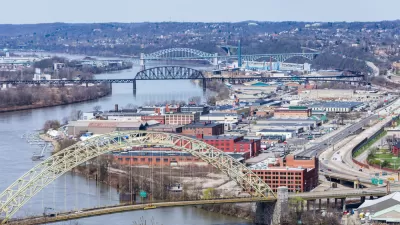Good news for Pittsburgh, which is now officially reversing decades of Rust Belt trends.
"Metropolitan Pittsburgh is a picture of stability entering 2016," according to an article by Stuart Hoffman, who proceeds to provide a veritable laundry list of good news:
Job growth is outpacing the Pennsylvania state average, and the unemployment rate for the seven-county region is steady near 5 percent. 2015 brought a resurgence in labor force growth, providing local employers a wider pool of talent from which to fill their ever-expanding payroll needs. Pittsburgh will manage steady gains throughout the coming year thanks to continued consumer spending.
Among the many other examples of good news included by Hoffman in this comprehensive overview of the Pittsburgh economy: "job growth here finished 2015 at a year-over-year pace as strong as any since 2001." And perhaps in an example of burying the lede, from a planner's point of view anyway: "Pittsburgh’s long-time trend of population declines is in the early stages of a turnaround," says Hoffman, thanks to the overall positive direction of Pittsburgh.
FULL STORY: Moderate Growth in Store for Metro Pittsburgh in 2016

Montreal Mall to Become 6,000 Housing Units
Place Versailles will be transformed into a mixed-use complex over the next 25 years.

Planetizen Federal Action Tracker
A weekly monitor of how Trump’s orders and actions are impacting planners and planning in America.

DARTSpace Platform Streamlines Dallas TOD Application Process
The Dallas transit agency hopes a shorter permitting timeline will boost transit-oriented development around rail stations.

Without International Immigrants, the Rural US Population Would Be Falling 58%
Census data shows that population growth in rural areas is due in large part to international migrants.

Dead End: Nine Highways Ready for Retirement
The Freeways Without Futures report describes the nation’s most promising highway removal proposals.

Congressman Proposes Bill to Rename DC Metro “Trump Train”
The Make Autorail Great Again Act would withhold federal funding to the system until the Washington Metropolitan Area Transit Authority (WMATA), rebrands as the Washington Metropolitan Authority for Greater Access (WMAGA).
Urban Design for Planners 1: Software Tools
This six-course series explores essential urban design concepts using open source software and equips planners with the tools they need to participate fully in the urban design process.
Planning for Universal Design
Learn the tools for implementing Universal Design in planning regulations.
City of Mt Shasta
City of Camden Redevelopment Agency
City of Astoria
Transportation Research & Education Center (TREC) at Portland State University
City of Camden Redevelopment Agency
Municipality of Princeton (NJ)
Regional Transportation Commission of Southern Nevada





























